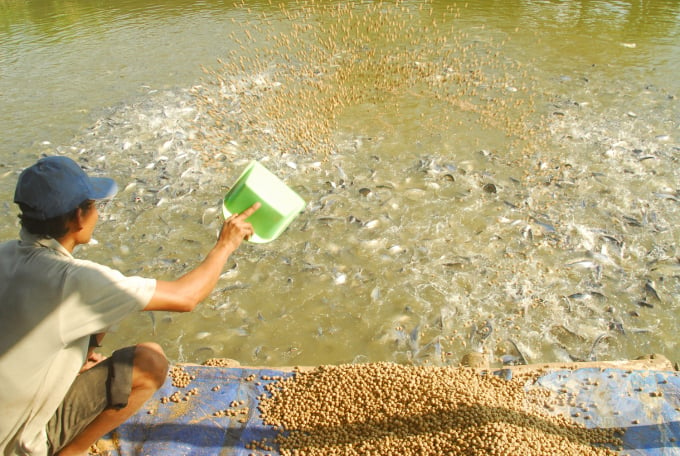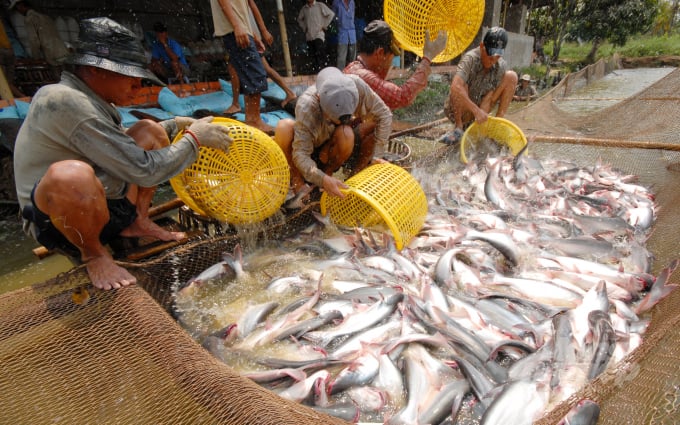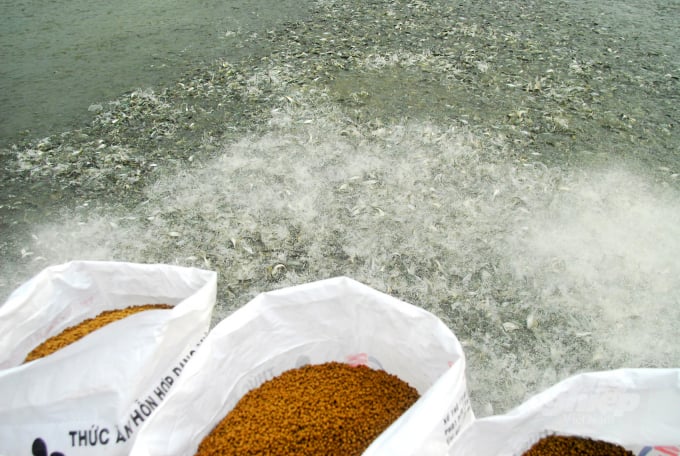June 19, 2025 | 22:19 GMT +7
June 19, 2025 | 22:19 GMT +7
Hotline: 0913.378.918
June 19, 2025 | 22:19 GMT +7
Hotline: 0913.378.918

This is the first time An Giang and Vinh Hoan Corporation (Dong Thap) cooperate to build a circular economy model to increase the value of pangasius. Photo: Le Hoang Vu.
Despite certain difficulties in 2020 and 2021, pangasius remains one of Vietnam’s key export seafood.
In the context that climate change has increased its severe impacts on the Mekong Delta (drought, sea level rise, saltwater intrusion, etc.), An Giang and Dong Thap are still the two provinces upstream with the greatest advantages to develop pangasius cultivation and processing.
With that being the reason, the People's Committees of An Giang and Dong Thap have agreed to submit a proposal to the Ministry of Agriculture and Rural Development (MARD) for consideration and approval. The proposal concerns investment policies with the intention to construct the common infrastructure in the project "Joint production of high-quality pangasius seed at Chanh Sach and Vinh Hoa dunes".
The project has a scale of 500 ha and an estimated total investment of VND 350 billion. The People's Committees of the two provinces also agreed to plan Vinh Hoa and Chinh Sach dunes’ entire area to produce high-quality 3-level pangasius breeds and supply Mekong Delta.

An Giang’s average pangasius farming area is approximately 1,300 ha/year. Photo: Le Hoang Vu.
Through the investment attraction policy of An Giang People's Committee, Vinh Hoan Corporation (VHC) has decided to establish Vinh Hoan Fish Hatchery Co., Ltd.
The headquarters is located in Vinh Buong hamlet, Tan Chau town, An Giang where the corporation currently has its focus on implementing the "Producing 3-level pangasius seed by applying high technology" project. With an area of 48.3 ha, the project aims to provide 1.6 billion spawns and 30 million pangasia per year.
Ms. Truong Thi Le Khanh, Chairman of the Board of Directors of Vinh Hoan Corporation, said, “The Covid-19 pandemic is still complicated. Businesses must first adapt to the current state if they want to develop and survive. They need to change their view on pangasius and reach new heights, especially through developing the pangasius model construction chain following the circular economy.”
VHC has also built a feed factory with a capacity of 350,000 tons/year as well as Mai Thien Thanh Co., Ltd which specializes in producing organic fertilizers to serve crops.
Accordingly, dead pangasius carcasses, sludge during farming, and waste products during fish processing will be collected and processed into organic fertilizer. This approach, together with the in-pond raceway system (IPRS), helps to complete the circular economy model (closed farming and processing without discharging water or waste into the surrounding environment).

VHC currently has its focus on implementing the earliest "Producing 3-level pangasius seed by applying high technology" project in Vinh Buong hamlet, Tan Chau town, An Giang. Photo: Le Hoang Vu.
As shared by Mr. Tran Anh Thu, Vice Chairman of An Giang People's Committee, the People's Committee fully supports the efforts to change and restructure the pangasius industry to raise the products’ value as the way Vinh Hoan Joint Stock Company does.
The province always commits to accompanying businesses and suggests that export seafood enterprises located in An Giang need to build high-tech pangasius farming areas and invest in solar power systems.
Translated by Samuel Pham
![Turning wind and rain into action: [9] Digitizing hydrometeorological data in response to climate change](https://t.ex-cdn.com/nongnghiepmoitruong.vn/608w/files/news/2025/06/17/z6704423696987_15fd32ffc26d590d204d520c9dac6786-nongnghiep-165943.jpg)
(VAN) Farmers have begun accessing hydrometeorological applications to adjust their cropping schedules, aiming to ensure productivity and adapt to climate change.
![Turning wind and rain into action: [8] Real-time salinity detection and early warning technology](https://t.ex-cdn.com/nongnghiepmoitruong.vn/608w/files/news/2025/06/17/z6704423696987_15fd32ffc26d590d204d520c9dac6786-nongnghiep-151127.jpg)
(VAN) Thanks to the integration of modern hydrological-hydraulic models, remote sensing technologies, and artificial intelligence, the accuracy of hydrological forecasting has significantly improved.
![Turning wind and rain into action: [7] Early disaster warnings help marine farmers minimize losses](https://t.ex-cdn.com/nongnghiepmoitruong.vn/608w/files/news/2025/06/17/z6704423696987_15fd32ffc26d590d204d520c9dac6786-nongnghiep-142942.jpg)
(VAN) In recent years, thanks to early disaster warnings and forecasting, marine farmers in Khanh Hoa province have been able to reduce risks and losses, thereby improving production efficiency.
![Turning wind and rain into action: [6] ‘Four on-the-spot’ disaster management software](https://t.ex-cdn.com/nongnghiepmoitruong.vn/608w/files/news/2025/06/17/e5a48259d6a262fc3bb3-nongnghiep-183800.jpg)
(VAN) By simply activating the scenario on the disaster management software, the relevant authorities immediately know how many households need to be evacuated, where to evacuate them to, and by what means of transportation…
![Turning wind and rain into action: [5] Hue applies modern technology in disaster forecasting](https://t.ex-cdn.com/nongnghiepmoitruong.vn/608w/files/news/2025/06/17/z6704423696987_15fd32ffc26d590d204d520c9dac6786-nongnghiep-093938.jpg)
(VAN) In Hue city, modern technology has recently been applied in meteorological and hydrological forecasting and warning, helping to reduce the damage caused by natural disasters.

(VAN) A cutting-edge farming technique being implemented on an experimental ranch in Arizona's Sonoran Desert has already saved a billion gallons of water over five years, according to Civil Eats.

(VAN) Poultry and pig production and the environment can be boosted through enhanced water technology, according to new research.